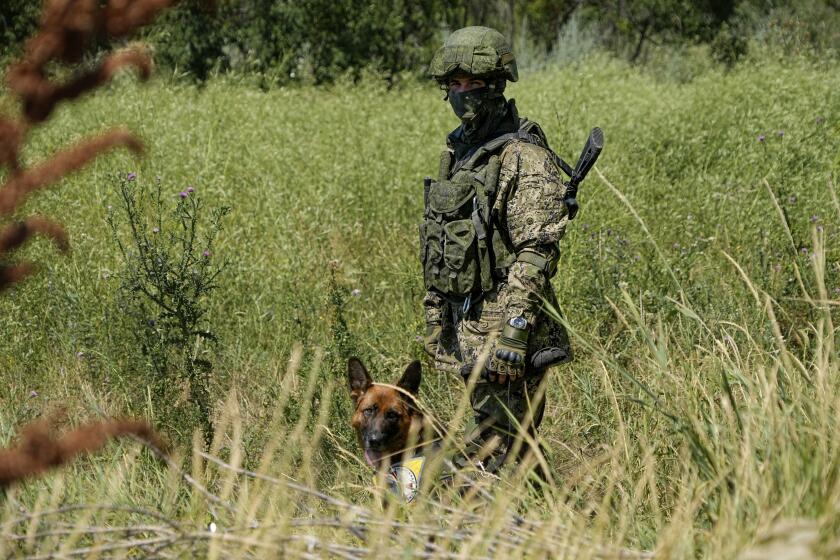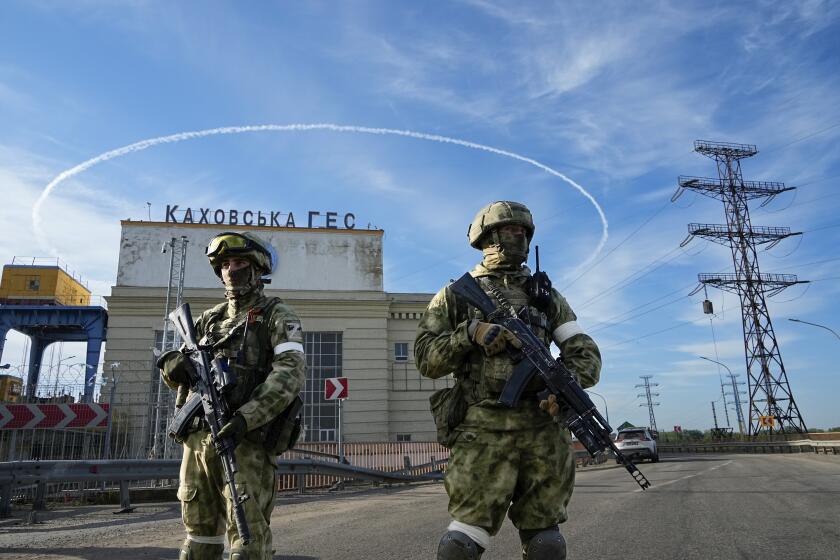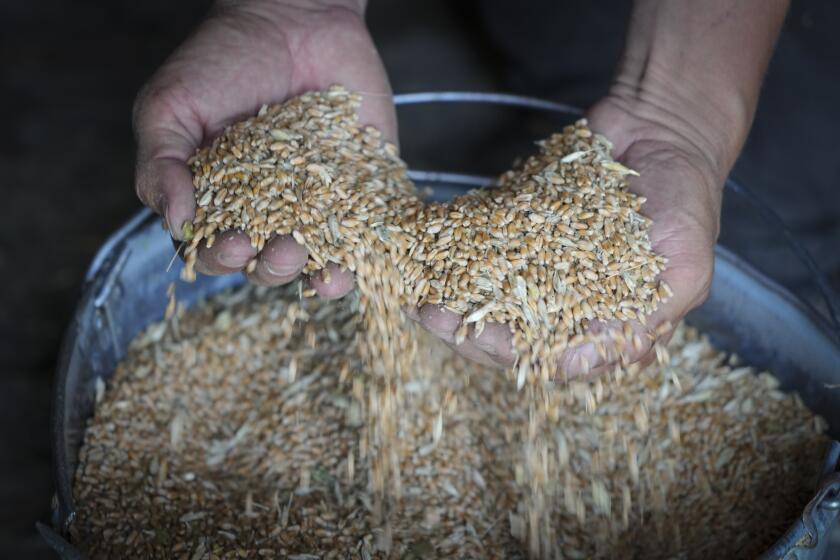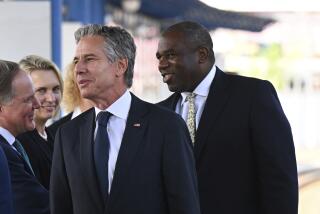West pledges more money and weapons for Ukraine after Zelensky appeal

‘The sooner we stop Russia, the sooner we can feel safe,’ Ukraine’s leader told Western defense officials at a conference, in a plea for more aid.
KYIV, Ukraine — On a day of give and take, Western nations made more pledges to send arms to Ukraine while the European Union’s full ban on Russian coal imports kicked in Thursday amid intelligence claims that sanctions against Moscow were hurting its defense exports.
Germany, seen early in Russia’s invasion as a lackadaisical Ukrainian ally, is making what Chancellor Olaf Scholz described as a “massive” break with its past by sending weapons to the war-ravaged country.
Scholz said Germany “is shipping arms — a great, great many, sweeping and very effective. And we will continue to do so in the coming time.” His government has approved military exports of at least $710 million and plans to provide further financial aid to Ukraine, the chancellor said.
In Copenhagen, Britain and Denmark also made additional commitments to help Ukraine’s defense against Russia’s invasion, which has devastated the nation and reverberated across the world.
“We will not let you down,” Danish Prime Minister Mette Frederiksen said as she opened a daylong international donor’s conference. Denmark said a new contribution of $113 million would push the total amount of funding from the small northern nation of 5.8 million to over $500 million. She called it “a huge donation.”
Moscow has refused to conduct a full-blown mobilization even as it suffers losses in Ukraine, where the war has dragged on for nearly half a year.
In comparison, Ukraine’s top donor, the United States, has committed $9.1 billion in security aid since Russian troops invaded on Feb. 24.
To put more pressure on Russia, Britain announced it will send additional multiple launch rocket systems and guided missiles to Ukraine. The missiles can hit targets up to 80 kilometers (50 miles) away with pinpoint accuracy, the U.K. government said.
The new weapons, whose number wasn’t specified, come on top of several rocket-launch systems Britain provided earlier this year after Russian President Vladimir Putin ordered troops into Ukraine.
British Defense Secretary Ben Wallace said the bolstered military support shows the West “will stand shoulder-to-shoulder, providing defensive military aid to Ukraine to help them defend against Putin’s invasion,” Wallace said at a meeting of mostly northern European allies of Ukraine.
Ukrainian President Volodymyr Zelenskyy pleaded by videoconference for more aid. “The sooner we stop Russia, the sooner we can feel safe,” he said.
Britain said that Moscow was already strained by the need to produce armored fighting vehicles for its troops in Ukraine and hence “is highly unlikely to be capable of fulfilling some export orders,” in a sector it has long taken pride in.
Stealth operations and assistance from Ukrainian guerrilla forces pose a growing challenge to Russia’s grip on occupied areas in southeastern Ukraine.
The British defense intelligence update, highlighting “the increasing effect of Western sanctions,” dovetails with Western belief that the series of measures they imposed on the Kremlin since the Feb. 24 invasion of Ukraine are increasingly having an impact on the Russian economy.
The update said that because of the war and sanctions, “its military industrial capacity is now under significant strain, and the credibility of many of its weapon systems has been undermined by their association with Russian forces’ poor performance.”
As the war nears the half-year point, Russia faces other challenges. Amid reports that hundreds of Russian soldiers were refusing to fight and trying to quit the military, covert recruitment efforts are underway that include using prisoners to make up for a shortage in trained troops.
Russia military credibility came under more pressure on Wednesday when Ukraine said nine Russian warplanes were destroyed following explosions at an air base in Russian-controlled Crimea that appeared to be the result of a Ukrainian attack.
Russia denied any aircraft were damaged in the blasts — or that any attack took place. But satellite photos clearly showed at least seven fighter planes at the base had been blown up and others probably damaged.
The U.K.’s Wallace dismissed Russian explanations of the blasts, including a wayward cigarette butt, as “excuses.”
“When you just look at the footage of two simultaneous explosions not quite next to each other, and some of the reported damage even by the Russian authorities, I think it’s clear that that’s not something that happens by someone dropping a cigarette,” the British minister said.
Russia’s invasion of Ukraine has upended the operations of what was the world’s fourth-largest grain exporter, with global consequences.
In other developments Thursday, the governments of Ukraine and Russia traded more accusations over which side was responsible for shelling the territory of the Zaporizhzhia Nuclear Power Plant.
U.N. Secretary General Antonio Guterres appealed to Moscow and Kyiv to stop military action around Europe’s largest nuclear plant to avoid a catastrophe.
“Regrettably, instead of de-escalation, over the past several days there have been reports of further deeply worrying incidents that could, if they continue, lead to disaster,” Gutteres said.
The European Union’s ban on coal imports from Russia took effect following a long phase-in that started in April. The 27-nation EU said it will affect about 25% of Russian coal exports and create a loss of about $8 billion a year. The EU is also trying to wean itself off Russian gas imports, but is too dependent to impose a full ban.
This week, there also were calls to impose a ban on Russian tourist visas, but Scholz placed the responsibility for what he described as “a criminal war” squarely with Putin, indicating the German leader did not support such a move.
And in perhaps the most symbolic example of give and take on Thursday, McDonald’s announced plans to start reopening some of its restaurants in Ukraine in the coming months. The fast-food giant shuttered and sold hundreds of its Russian locations in March,
The company closed its Ukrainian restaurants after Russia’s invasion in late February but has continued to pay more than 10,000 McDonald’s employees in the country. It said it would gradually reopen some restaurants in the capital, Kyiv, and in western Ukraine.
Looking beyond a hoped-for return to peace, Scholz said Germany was working with the EU to develop plans for the reconstruction of Ukraine.
“That is going to be a big, big task which can hardly be described as a Marshall Plan,” he said, referring to the massive U.S. aid plan for Europe in the wake of World War II. “It’s bigger.”
More to Read
Sign up for Essential California
The most important California stories and recommendations in your inbox every morning.
You may occasionally receive promotional content from the Los Angeles Times.













